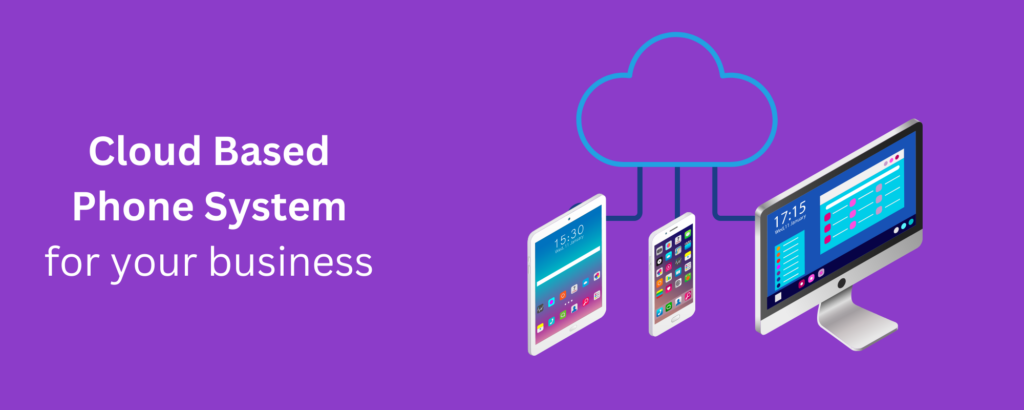Quick Menu

Welcome to our comprehensive guide on the benefits of transitioning to cloud phone systems over traditional landline phones for businesses. In today’s digital age, communication is the backbone of every successful organisation. By leveraging the capabilities of cloud-based phone systems, businesses can streamline operations, enhance flexibility, and unlock a myriad of benefits that drive growth and success. Join us as we explore how making the switch to cloud phone systems can revolutionize your business communication strategy.
Section 1: Understanding Cloud Phone Systems
Definition:
Cloud phone systems, also known as Voice over Internet Protocol (VoIP) phone systems, leverage internet connectivity to transmit voice calls rather than traditional landline infrastructure. Unlike conventional phone systems that require on-premises hardware and maintenance, cloud phone systems operate through software hosted in the cloud, offering scalability, flexibility, and cost savings for businesses of all sizes.
Key Features:
Cloud phone systems come equipped with a range of advanced features tailored to modern business needs. For example, features such as auto-attendants, call routing, voicemail-to-email transcription, and mobile apps empower employees to communicate seamlessly from any location, enhancing productivity and collaboration.
Section 2: Benefits of Cloud Phone Systems for Businesses
- Cost Savings:
By eliminating the need for costly on-premises hardware and maintenance fees associated with traditional phone systems, cloud phone systems offer significant cost savings for businesses. For example, a small business that switches from a traditional landline to a cloud phone system can reduce their monthly phone bill by up to 50%. - Scalability:
Cloud phone systems are highly scalable, allowing businesses to add or remove users and features as needed without the hassle of purchasing new hardware. For instance, a growing startup can easily scale their communication infrastructure to accommodate new hires and expansion into new markets without disruption. - Flexibility and Mobility:
With cloud phone systems, employees have the flexibility to make and receive calls from any internet-enabled device, whether they’re in the office, at home, or on the go. For example, a sales representative can use a mobile app to access their office phone system while traveling, ensuring they never miss an important call from a client. - Advanced Features:
Cloud phone systems offer a wide range of advanced features that enhance communication and collaboration within organizations. For instance, features like call recording, analytics, and integrations with CRM software empower businesses to gain insights into customer interactions and optimize workflows for improved efficiency and customer satisfaction. - Reliability and Redundancy:
Cloud phone systems are built with redundancy and failover capabilities to ensure continuous communication even in the event of network outages or disasters. For example, a business that switches to a cloud phone system can rest assured knowing that their phone service will remain operational during unforeseen circumstances, minimizing downtime and ensuring business continuity.

Section 3: Case Studies and Success Stories
- Case Study 1: BROS Code
- BROS Code, a mid-sized tech startup, transitioned from traditional landline phones to a cloud phone system to support their remote workforce. By enabling employees to make and receive calls from anywhere with an internet connection, BROS Code saw a significant increase in productivity and collaboration, leading to a 30% boost in sales within the first year of implementation.
- Case Study 2: Paper Solutions
- Paper Solutions, a multinational corporation with offices worldwide, replaced their outdated phone system with a cloud-based solution to streamline communication across geographically dispersed teams. With features like auto-attendants and call forwarding, Paper Solutions improved customer service and reduced call wait times by 40%, resulting in higher customer satisfaction ratings and increased revenue.
Section 4: Getting Started with Cloud Phone Systems
- Choose the Right Provider: Research and compare cloud phone system providers to find one that offers the features, scalability, and pricing that align with your business needs. Look for providers with a proven track record of reliability and excellent customer support.
- Migrate Existing Phone Numbers: Work with your chosen provider to migrate your existing phone numbers to the new cloud phone system seamlessly. This ensures minimal disruption to your business operations and maintains continuity for your customers.
- Train Employees on New Features: Provide comprehensive training for your employees to familiarize them with the features and capabilities of the new cloud phone system. Offer hands-on workshops, tutorials, and support resources to ensure a smooth transition and maximize adoption.
- Monitor Performance and Gather Feedback: Continuously monitor the performance of your cloud phone system and gather feedback from employees and customers to identify areas for improvement. Leverage analytics and reporting tools provided by your provider to track call metrics and optimize workflows accordingly.
- Stay Up-to-Date with New Features and Updates: Keep abreast of new features and updates released by your cloud phone system provider. Take advantage of new functionalities that enhance communication, collaboration, and efficiency within your organization.
making the switch to cloud phone systems offers numerous benefits for businesses looking to modernize their communication infrastructure and stay ahead in today’s competitive landscape. By embracing the flexibility, scalability, and advanced features of cloud-based communication, businesses can enhance productivity, reduce costs, and deliver exceptional customer experiences that drive success. Are you ready to unlock the power of cloud phone systems for your business? Let’s get started today!
Frequently Asked Questions
A cloud phone system utilizes internet connectivity to transmit voice calls, eliminating the need for physical phone lines and on-premises hardware. Unlike traditional landline phones, cloud phone systems offer scalability, flexibility, and advanced features tailored to modern business needs.
Cloud phone systems provide numerous benefits, including cost savings, scalability, flexibility, advanced features, and reliability. Businesses can streamline communication, enhance productivity, and improve customer service by leveraging the capabilities of cloud-based phone systems.
Cloud phone systems enable employees to make and receive calls from any internet-enabled device, whether they’re in the office, at home, or on the go. With mobile apps and softphones, employees can stay connected and productive from anywhere, enhancing flexibility and mobility in today’s remote work environment.
Cloud phone systems offer a wide range of advanced features, including auto-attendants, call routing, voicemail-to-email transcription, call recording, analytics, and integrations with CRM software. These features empower businesses to streamline communication, optimize workflows, and gain insights into customer interactions.
To get started with a cloud phone system, businesses should research and choose a reputable provider that offers the features and scalability they need. They can then work with the provider to migrate existing phone numbers, train employees on new features, and monitor performance to ensure a smooth transition and maximize the benefits of cloud-based communication.
